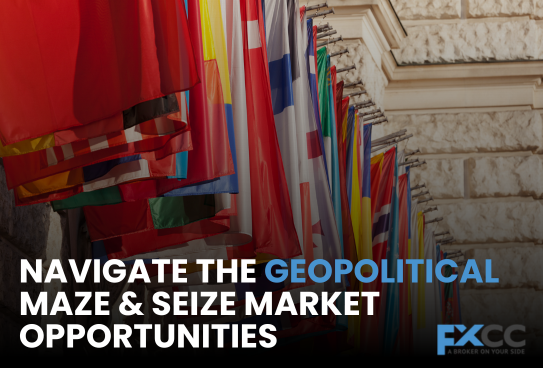Understanding the Correlation
In the intricate tapestry of financial markets, geopolitical events weave a thread of unpredictability. From elections and policy shifts to conflicts and natural disasters, these global occurrences can send shockwaves through the financial landscape. For traders, understanding and anticipating the impact of geopolitical events is akin to navigating treacherous terrain, where a misstep can lead to significant losses.

Key Factors to Consider:
- Market Sentiment: Geopolitical events often evoke strong emotional responses among investors, leading to rapid shifts in market sentiment. Fear and uncertainty can drive prices down, while optimism and confidence can push them up. This emotional rollercoaster can create both opportunities and challenges for traders.
- Risk Aversion: During times of geopolitical turmoil, investors tend to become more risk-averse, seeking safe-haven assets like gold and U.S. Treasury bonds. This shift in investor behavior can lead to a decline in demand for riskier assets, such as stocks and emerging market currencies.
- Economic Consequences: Geopolitical events can have far-reaching economic consequences, from trade disruptions and increased military spending to refugee crises and supply chain disruptions. These economic impacts can affect GDP growth, inflation, and interest rates, which in turn influence financial markets.
- Policy Responses: Governments and central banks may respond to geopolitical events with policy changes, such as interest rate adjustments or stimulus measures. These policy decisions can have a direct impact on financial markets, often leading to short-term volatility.
Trading Strategies:
- Diversification: Spread your investments across different asset classes and regions to reduce your exposure to geopolitical risk. This can help mitigate the impact of negative events while potentially capturing upside opportunities in other markets.
- Hedging: Use derivatives like futures and options to protect your existing positions against potential losses due to geopolitical events. Hedging can provide a safety net in uncertain times, but it’s essential to use it wisely to avoid excessive costs.
- Fundamental Analysis: Stay informed about geopolitical developments and their potential impact on economic indicators and market sentiment. A deep understanding of the underlying factors driving market movements can help you make more informed trading decisions.
- Technical Analysis: Use technical indicators to identify trends and patterns in price movements that may be influenced by geopolitical events. While technical analysis can provide valuable insights, it’s important to combine it with fundamental analysis for a comprehensive understanding of market dynamics.
- Risk Management: Set appropriate stop-loss and take-profit levels to limit your potential losses and protect your gains. Effective risk management is crucial in the volatile world of geopolitical trading, as it can help you avoid catastrophic losses and preserve your capital.

In conclusion, the geopolitical landscape, a complex tapestry woven with threads of conflict, cooperation, and change, can significantly impact financial markets. Understanding the key factors influencing market reactions, such as market sentiment, risk aversion, economic consequences, and policy responses, is crucial for navigating this volatile terrain. Staying informed about global events, analyzing their potential impact on economic indicators and market sentiment, and adapting trading strategies accordingly are essential for long-term success. While the geopolitical landscape can present both challenges and opportunities, those who can anticipate and respond to these events effectively may find themselves well-positioned to capitalize on the rewards.


